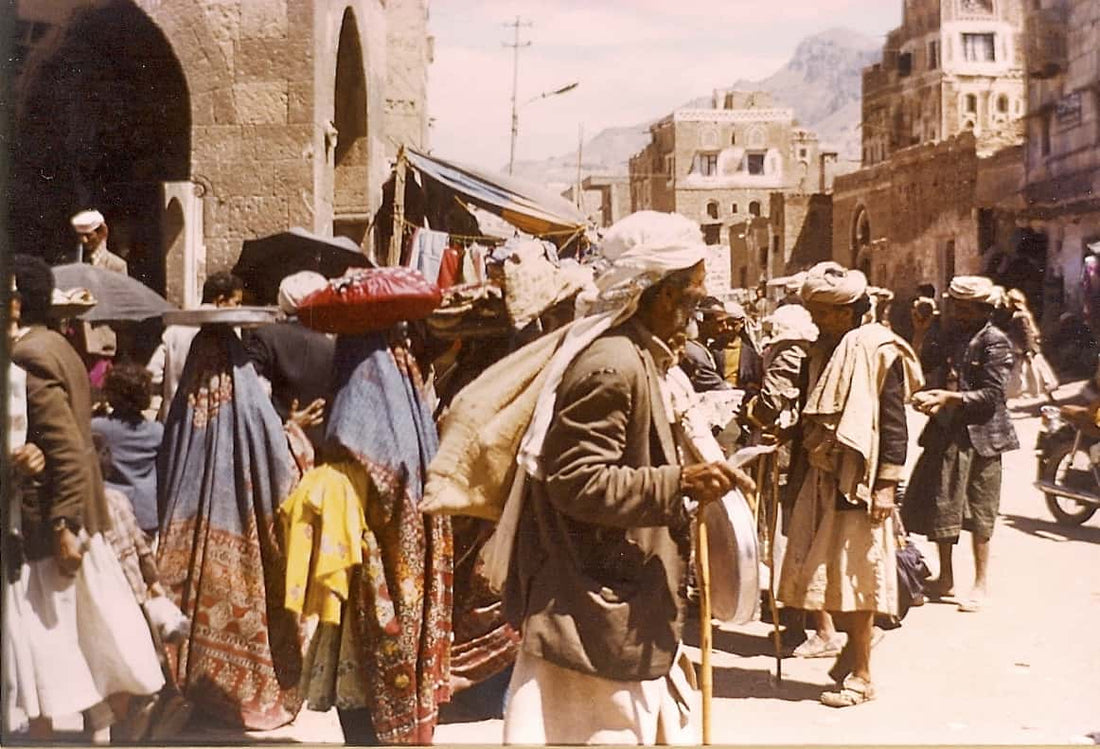
An Interview of Peggy Schaeffer: Peace Corps in Yemen

Recently, we had the honor of chatting with Peggy Schaeffer, a wonderful woman who, in the late ’70s, served in the Peace Corps in Yemen. A few weeks back, Peggy went to one of our Saturday Roasterie Tours and heard that we’ve been roasting a Yemeni coffee. After the tour, she reached out to us about her excitement for our Yemeni coffee and let us in on her personal experiences with the country of Yemen itself.
In 1977, Peggy and her husband went to Yemen with the Peace Corps. Peggy worked as a librarian, starting up a small but effective library in a local school while her husband worked as a nurse to start up a vaccination program. They lived in a town called Taizz, located in the Northern region of Yemen. At the time, Yemen was heavily divided by North and South and they were not permitted to leave the Northern region.
Northern Yemen was less progressive than the South, and this was easily seen among the slowness of Northern Yemen’s development. There were no phones, no televisions, and only some parts had electricity. Many people were still contracting illnesses like chickenpox or measles.

However, Peggy shared her delight in being able to see transitions of development during her time in Yemen. Due to her husband’s vaccination program, people were actually able to prevent some of the previously mentioned diseases and illnesses. Because of Peggy’s library, children had the opportunity to actually bring books home to share with their families. Before her program, the only book that families kept in their homes was the Quran. Additionally, a few televisions starting making their way to Taizz.
Peggy also took delight in the culture of Yemen, specifically in terms of family lifestyle and community. She explained that, at the time, Northern Yemen was a very traditional culture. The majority of women were stay-at-home moms and homemakers. Most families were very large and their homes were multigenerational. These communities of families would raise their children together. They would cook their food together. They truly lived life together. Peggy found such warmth among this way of life and shared that she especially missed it when she returned to the United States.
The part of the culture that came to her as more of a shock than the cultural warmth was, however, the unpredictability of Yemen. Yemeni people lived by the phrase, “If Allah wills,” in every circumstance. For example, rather than on an hourly schedule, the bus would arrive “if/when Allah wills.” This was true of meeting up with friends as well. Peggy described that there was incredible unpredictability in daily life due to this phrase. After the initial shock, though, she was thankful for this challenging way of life as she now is a much more flexible person in her own life.
On a more political scale, Yemen’s culture has had many ups and downs since Peggy’s time there. The largest cultural event that she experienced was the assassination of Ahmad al-Ghashmi, the President of the Yemen Arab Republic, in Northern Yemen.
In regards to coffee, Peggy saw an extremely small amount. Though Yemen has been known for its coffee for centuries, there has been quite a struggle to grow coffee, mainly due to changes in Yemen’s political, economic, and agricultural state over the past several decades. Nowadays, though, Yemen’s coffee industry has begun regrowing and rebuilding. The result is extremely high-quality crops that are much unlike any coffee we’ve ever tasted. Coffee exported from Yemen is still very expensive to purchase because even with the recent surge in producers, Yemeni coffee amounts to less than 0.1% of all coffee grown in the world.

Aside from Yemeni coffee being super high quality and full of unique flavors, we purchase it because we have the opportunity to support Yemeni farmers in their efforts to improve Yemen’s economic state. We love to honor people and support them as they step into growth.
Peggy still holds Yemen close to her heart and we’re honored that she would share her stories and insight with us. Hopefully, you’ve enjoyed hearing a bit about Yemen, too!
Though the majority of us may never get to visit Yemen ourselves, it’s such a treasure to be able to connect to people across the world through coffee. We know that coffee creates community, and that’s what we’re all about!
To try our Yemeni coffee, buy a bag here.
To take a tour like Peggy did, sign up for one here.
